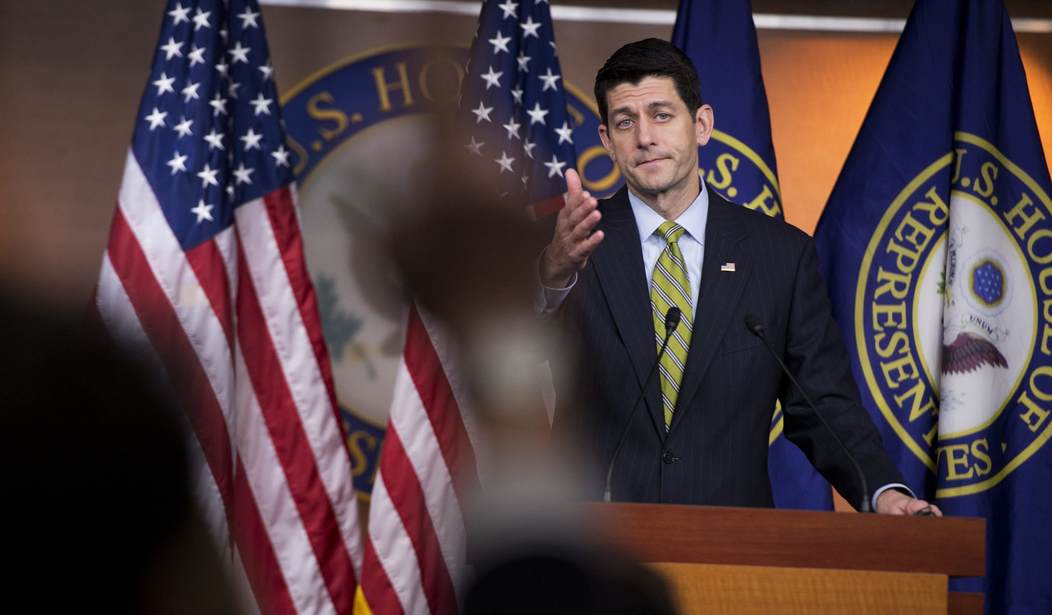Speaker of the House Paul Ryan made a statement on Tuesday, emphatically declaring that he will not be the Republican nominee for president. His statement follows weeks of speculation that Republican elites would push a candidate besides Donald Trump, Ted Cruz, or John Kasich in the case of an open convention, and that Ryan would most likely be that candidate.
Ryan set out to quash those rumors, and clearly stated that he will not accept the Republican nomination even if it is offered to him. He also attacked the idea that anyone not running for president should be chosen as the nominee, and explained why the presidential race is fundamentally different from his earlier race for speaker of the House of Representatives.
“I do not want, nor will I accept, the nomination for our party,” Ryan flatly declared. “I chose not to [run for president], therefore I should not be considered. Period. End of story.”
The House speaker directly addressed the delegates to the July Republican National Convention in Cleveland, Ohio. He told them, “If our candidate does not have a majority of delegates on the first ballot, I believe that you should choose between people who are actually running.”
“Let me say again, I am not going to be our party’s nominee,” he concluded.
Nevertheless, Ryan explained that he will continue to be in the spotlight, and he also told reporters why. “Politics today, it tends to drift toward personality contests rather than policy decisions. Insults get ink more than ideas, but we still owe it to the country to show what we will do if given a mandate from the country.”
“That’s why I’ve been giving speeches,” Ryan explained, repeating the mantra that the House of Representatives should set the policy agenda for the Republican presidential race. “I believe we can once again be an optimistic party, that is defined by the limitless possibility of our people.”
Ryan listed many conservative ideas as the bulwark of such a party. He encouraged Republicans to “embrace free enterprise and reject cronyism,” and to “offer a tax code that rewards work, not the well-connected.” Above all else, he championed the American idea that “the condition of your birth doesn’t determine the outcome of your life.”
“Not running does not mean I am going to disappear,” Ryan declared. “This job provides a platform to communicate a conservative vision for our country, not for me, but for my House colleagues…to prepare for the fall campaign with the eventual nominee so we can earn the mandate we need to get things right.”
One reporter voiced a key question that has fueled concerns that Ryan will swoop in like an “establishment” savior to be the nominee. He noted that Ryan also denied that he would run for the position of speaker of the House last fall, but when it became clear he would be a perfect consensus candidate, he accepted the mantle. What assurances do we have that the same situation will not occur in the case of an open convention?
Next Page: Ryan’s definitive response.
To this question, Ryan instantly responded that comparing the two races would be to compare “apples and oranges.”
“Being speaker of the house is a far cry from being president of the United States,” Ryan said. He noted that before becoming House speaker, “I was already in the House, I was already a congressman.”
“This is entirely different than getting the nomination for president of the United States for your party,” he declared. “If you want to be president, you should actually run for president.”
Ryan also added that, as chairman of the Republican National Convention, it is his job “to make sure that the rules are followed.” Those rules are rather simple: when delegates arrive in Cleveland in July, three delegates from each state and territory will come together to form the rules committee, and they will determine the rules.
There has been speculation that Rule 40, a stipulation that the eventual nominee win a plurality of the vote in eight states, would keep any candidate besides frontrunner Donald Trump and runner-up Ted Cruz from being eligible as the party’s nominee. If the rules committee decides to keep this rule, that will remain true, but the committee is not bound to keep it.
Different states have different rules about how long their delegates are bound to support the winner of each state or congressional district. After the first ballot, many of those delegates are freed to support whichever candidate they prefer. Cruz has done the hard face-to-face work to try to elect delegates who generally support him, even if they will be bound to Trump on the first ballot.
This is a controversial strategy, first employed by Texas Representative Ron Paul in his 2012 race but ultimately ineffectual then. While controversial, this is entirely within the grounds of fair play. A presidential candidate must win the majority of RNC delegates to win the nomination — a popular vote plurality or even majority is not enough to win the nomination.
The Washington Examiner‘s Byron York has argued that if Cruz were to win at the convention, despite a popular vote victory for Trump, this would undermine the legitimacy of the Republican nomination for president. The Republican Party is a political party, however, not a purely democratic organization. It is perfectly legitimate for the party to back a candidate who has received fewer votes, even if it might make some Trump supporters recall the 2000 election, where Gore won the popular vote but was denied the presidency.
Avi Snyder argued in National Review that the Republican Party should allow history to repeat itself. Referring to the GOP nominating contest of 1912, Snyder pointed out that former president Theodore Roosevelt had won a few scattered primaries (and thus more votes) than sitting President William Howard Taft. Nevertheless, the party leaders backed Taft, even though Roosevelt threatened to run in a third party.
Snyder argues that the party was right to deny Roosevelt, since he was not a true conservative at that point. Roosevelt had embraced the Progressive movement, and even though he was popular, the Republican Party chose to represent conservatism, no matter the cost. Snyder argued that Trump represents a similar threat, and that the party would be justified in denying him the nomination on that account.
This heated debate underscores a point that House Speaker Paul Ryan mentioned in his remarks. “We have too much work to do in the House to allow this speculation to swirl,” he declared. Much ink and worry has been spilt on the presidential race, but policy in Congress is also vitally important. Conservatives now have more evidence to take Ryan at his word when he says his focus is in the House of Representatives, and not on the Oval Office.









Join the conversation as a VIP Member